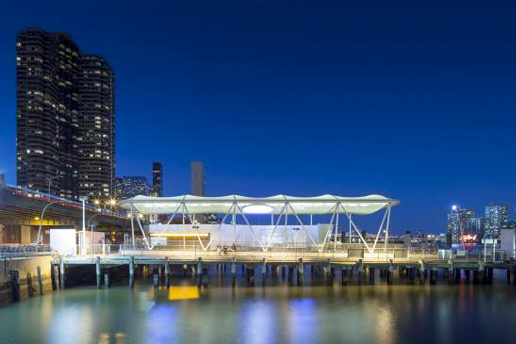
Sheila Kennedy, Professor of the Practice in MIT’s Department of Architecture, has been presented with the inaugural Design Innovator Award by Architectural Record magazine, part of their new program to acknowledge the increasingly visible role of women in the profession. The award honors her consistent body of work in advancing innovation in materials and new building types; Kennedy’s work explores the intersections of architecture, digital networks, and new types of public space.
An example of her innovative work is the East 34th Street Public Ferry Terminal in Manhattan (pictured). Awarded the New York AIA’s Design Excellence Merit Award in 2014 — and selected as Building of the Month for October 2014 by Culture Now and the New York AIA — it is the first public project in New York City to be constructed with digitally fabricated shop-built components delivered for rapid on-site construction. The design is guided by principles of soft, resilient infrastructure and features an interactive sensing system that registers the tidal flows moving under the river’s surface.
A founding Principal of Kennedy & Violich Architecture Ltd. (KVA), Kennedy has been designated as one of Fast Company’s Masters of Design, described as an “insightful and original thinker who is designing new ways of working, learning, leading and innovating.” In 2000, she established MATx, a pioneering materials research unit at KVA which engages applied creative production across the fields of design, electronics and architecture, and material science.
MATx works collaboratively with business leaders, manufacturers, cultural institutions, and public agencies to create designs, building components, and architecture that advances the widespread implementation of sustainable digital materials. The MATx Portable Light Project, a non-profit global initiative that enables people in the developing world to create and own portable energy-harvesting solar textile kits has been recognized with a 2009 U.S. Congressional Award, a 2009 Energy Globe Award, and a 2008 Tech Museum Laureate Award for technology that benefits humanity.
Press inquiries: miteimedia@mit.edu